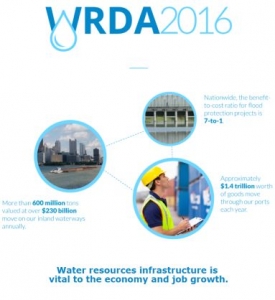
Traditional versus non-traditional spending, $5 billion versus $9 billion, earmarks versus no earmarks … the U.S. House and Senate are on a collision course over an infrastructure bill again. As always, projects are in danger and this time the projects and funding are wrapped up in opposing versions of the Water Resources Development Act (WRDA) of 2016.
In late April, a Senate committee passed its version of the bill with traditional funding for maritime infrastructure projects. But the $9 billion bill also included numerous other “provisions,” including $220 million in funding to help the city of Flint, Mich., deal with its crisis involving lead in its drinking water.
 A House committee followed up last week by passing its own, and different, version of WRDA. It authorizes $5 billion in traditional funding for projects such as ports, waterways, lock and dam systems, flood protection and recreation. However, the costs of more than two-dozen proposed projects in the bill would be offset by deauthorizing $5 billion in old projects that were approved but never completed.
A House committee followed up last week by passing its own, and different, version of WRDA. It authorizes $5 billion in traditional funding for projects such as ports, waterways, lock and dam systems, flood protection and recreation. However, the costs of more than two-dozen proposed projects in the bill would be offset by deauthorizing $5 billion in old projects that were approved but never completed.
Unlike the Senate version, the House version does not emphasize drinking water and wastewater system projects, nor does it allocate funding to the city of Flint. The House bill would ensure that by FY 2017, Harbor Maintenance Trust Funds will be used for harbor maintenance alone, instead of the recent practice of using some of the funds for other areas of the budget.
The House bill also seeks to involve more local partners in implementing Corps projects and to expedite approval for modifications on current projects. One provision would put the WRDA back on a two-year cycle, hopefully ensuring that a backlog of projects cannot exist. Proponents argue that more regularly addressing the needs of the nation’s maritime infrastructure will create and sustain jobs and allow American ports to remain economically competitive.
One of the biggest differences in the two versions is that the House bill includes no earmarks, while the Senate bill provides funding dedicated to improving drinking water and wastewater systems. In an effort to increase water supplies and improve both water and wastewater systems throughout the country, the Senate bill would authorize $6 billion for programs under the Safe Drinking Water Act and Clean Water Act. Grant programs would also be established to assist with maintenance and upgrades on community water and sewage treatment plants.
Policy changes are also a large part of the Senate bill. The bill would authorize the following: permission for the Corps of Engineers to provide technical assistance to independent feasibility studies, expansion of Corps authority to accept state and local funding for all water resources projects; assurance that an increasing amount of Harbor Maintenance Tax funds are used for dredging at ports; and allowing service providers to operate Corps recreational facilities in exchange for the collection of user fees.
Congress will begin a summer recess July 16. Members of both chambers say they hope to pass some version of the WRDA before the break begins. However, the process is very slow. Once the House and Senate have passed their versions of the bill, a conference committee must be named to try to iron out the differences and present a bill that both chambers can support.
Public officials in every state are closely monitoring the activity and private-sector firms are just as interested in the ultimate outcome. With millions at stake for the funding of critically needed projects, governmental entities could get long overdue relief, jobs will be created and private-sector firms will be able to compete for thousands of government contracting opportunities that will result with funding.
SPI’s newsletters are excellent sources of government procurement news. Subscribe here.
